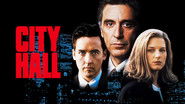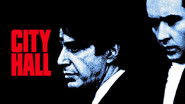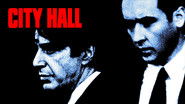SnoopyStyle
Kevin Calhoun (John Cusack) is a loyal deputy mayor who admires Mayor John Pappas (Al Pacino) of NYC. He is ambitious and a real operator. A simple day gets turn on its head when off-duty police detective Eddie Santos meets with Tino Zapatti nephew of a mob boss. They get into a shootout which kills them and a 6 six year boy. There are questions about Santos and police lawyer Marybeth Cogan (Bridget Fonda) defends his name. There is also a question about a light sentence headed down on Zapatti by Judge Walter Stern (Martin Landau) who is an old friend of the mayor. Kevin has to fight to uncover the truth which includes crooked politician Frank Anselmo (Danny Aiello).It's a bit scattered with lots of characters all with their own agendas. It has a lot of great scenes with Al Pacino as the all-knowing mayor. Cusack is also great as the idealistic operator. It's a good sprawling political thriller. I love all the backroom talks, the glad-handing, the political deals, the crooked politicians and the underhanded maneuvers. It's a fine political drama.
g-bodyl
City Hall is a rather interesting, if not by the books political thriller that highlights the everyday corruption we see in American politics. It's not really eye-opening, but it's relevant in today's world despite the film being made eighteen years ago. This film is not about what happens on the outside, but what happens on the inside. Those who want to study politics may want to check out this film.Harold Becker's film is about how a scandal which involved a dead cop and a dead six-year-old, changed the lives of the mayor and his deputy mayor. The mayor, John Pappas is known for his brilliance and the deputy mayor, Kevin Calhoun is just as smart. But when a lawyer accuses the mayor of corruption, Calhoun must decide whether to follow his idol or to part sides.The acting is pretty good for the most part. Al Pacino has done better roles in his career, but though he seems to not particularly try here, he seems to do an okay job. John Cusack was excellent, and this is one of his better roles of the 90's. I don't understand why Bridget Fonda is in this movie since her character really is of no relevance, but I guess she did fine. Danny Aiello was excellent as the corrupt political boss of Brooklyn.Overall, City Hall is little above average political thriller that is extremely predictable, but still quite enjoyable and thrilling. It tells a good lesson about corruption in politics, but the story could have used some tweaking. But all-in-all, I was able to enjoy the film for what it is: A good, old-fashioned political thriller. I rate this film 8/10.
ElMaruecan82
Ever since Frank Capra and "The Godfather" movies, Cinema had shattered faith on American politicians and I guess, reality finished the job. And given the requirements of the political thriller genre, dissociating the word 'politician' from the epithet 'crooked' became unconceivable, and Harold Becker's "City Hall" is no exception: the script co-written by three giants: Bo Goldman, Nicholas Pileggi and Paul Schradder, depicts politicians as puppets with money as the strings held by criminals.The games had its rules and one of them was to never harm, let alone, kill, innocent people. In "Scarface", Tony Montana owed his demise to this principle and Eliott Ness couldn't overlook the explosion that killed a poor little girl in "The Untouchables". "City Hall" opens with an off-duty cop and an in-probation criminal linked to the mob, meeting on a rainy day and shooting at each other. Nothing we're not familiar with, but then there's a stray bullet that takes the film to an unexpected direction, killing a 6-year little boy going to school with his father.When a bullet kills a child, the community can't close eyes. We know the bullet hasn't finished its trajectory and many other heads will follow. The film is basically about the aftermath of the triple-murder, a thrilling investigation and its political domino-effect. What makes it even more riveting relies on the character who desperately tries to reassemble the pieces of the puzzle: Kevin Calhoun, John Cusack in his 'boyish look' days, as the deputy of an ambitious and charismatic lawyer named John Pappas, played by a Pacino at the top of his game (sometimes over it). Calhoun asks a friend about the killer's probation and what follows is a great piece of dialog. David Paymer's character looks confused. "Isn't the document kosher enough?" "No, it's too kosher." We get the message.In other words, the Judge let a gangster free while he deserved to be sentenced for jail for more than 10 years. And the 'signal' alert starts ringing when Calhoun discovers that the judge happens to be a friend of John Pappas. Calhoun tries to protect his mentor, little he knows that Pappas will also be revealed as the mastermind of the whole operation. Mastermind is a bit too much; in fact, this is a benign case of political corruption. Then Mobster Zappati wants to spare his nephew a 15-year sentence, he orders his friend, a Brooklyn mayor, named Anselmo, played by a great Danny Aiello to 'persuade the judge', a good friend of John Pappas, which loops the loop. Meanwhile, Anselmo orders to hide 40 000 dollars in the cop's home to imply that he wasn't that clean. Really small potatoes, we've seen worse.But all of these actions are aggravated by the dramatic turn it took, when a lamb was sacrificed at the altar of political corruption. But more dramatic, even tragic, is the unforgivable turn the film takes as it deliberately screws up the mechanism it confidently built up. It all starts with Bridget Fonda's character as the lawyer representing the cop's widow and struggling to clear her husband's name, in order to get a full pension
well, if it wasn't meant to be a sort of 'romantic' subplot, why a beautiful blonde for that? And this is where the film starts to lose its beat, because there's nothing she brought up that Calhoun couldn't have discovered alone. The whole ride to 'buffalo' was just the set-up to a cringe-worthy ending that didn't even make sense in the first place.Basically, Fonda is the film's first mistake, and the poster could have done without her. There was so many great moments, a reunion between Anselmo and his business partners, his last conversation with Zapatti which had the same powerful undertones as the unforgettable meeting between Tom Hagen and Frankie Pentangeli in "The Godfather Part II". The film even has the intelligence to spare us some random action scenes, it's all in the mystery surrounding the opening crime, it's one hell of a political whodunit, meaning: who committed the first mistake? And the only character for the film is Calhoun, whose arc will change from idealism to an awareness of the limitation of the political world. If anything, the film had to conclude on a sad and melancholic note.Instead, we have that upbeat tone at the end, where he campaigns for some candidature I didn't even care about and an exchange of a few wisecracks with Bridget Fonda. That 'bullet killing a child' was the plot device that belonged to "City Hall" and no other film could have used it instead. Imagine the conversation, you know "City Hall"? "City what"? The film where a kid gets killed during a shoot-out and Pacino makes a speech during his funeral." "Yeah, I remember that movie, so
how about it?" "Well, it could have been much better." Unfortunately, the film is so thought-provoking and subversive that some other parts simply didn't work, the ending, Bridget Fonda, and the fact that we're left confused about the future of John Pappas.It's incredible that a screenplay written by the authors of "One Flew Over the Cuckoo's Nest'", "Scent of a Woman", "Goodfellas", "Casino", "Taxi Driver" and "Raging Bull" couldn't come up with a more explosive material. A disappointing collective work, for a film with a very promising concept, a stellar cast, but the conclusion of an ordinary TV movie. That 'bullet killing a child' deserved more. When you have such an original opening, you can't afford such a cheap and ordinary ending, much more one that doesn't even ring true : in other words, this was a man's film.Indeed, it could have been to political thrillers what "Heat" was to the gangster genre, it could have been even longer, what a waste of performances, especially Aiello who was astonishing.
Dr Jacques COULARDEAU
The film concerns a classic theme. In fact it concerns the theme exploited by Batman, from beginning to end, but in real data and details. The mayor of New York, appreciated and very diligent and dynamic, in order to get some project through slightly faster than normal, yields to some pressure from some private business contractors about a criminal drug dealer who should have been sent and kept in prison and he pressurizes the judge in his turn to set him free on probation in spite of a negative probation report that disappears but is not destroyed, be it only because of the political value it represents. And what was to happen happens and a few people, including a black schoolboy is killed in a shoot out between a police detective and that criminal. The city may explode because of it: racial tension because of the black school boy and social tension because of the insecurity such criminals free to roam around and go on with their criminal activities represent to the public. Unluckily the film does not show that tension very well and follows the investigation of the first deputy mayor who wants to find out the truth and does find it out. But along the way a few witnesses are killed, and those who had played some role in the whole business are forced to retire (the judge), to end their career and life (the contractor or the contractor's go between), a public officer who was ready to deliver the disappeared probation report, and some shady character after he provides some crucial information. The mayor himself retires and takes a long vacation; But the main interest of the film is in the exploration of the contortions the mayor is doing to cover up the problem and the contortions he remembers having done in the past that led to the mistake about this probation case. The political philosophy that nothing is pure white or pure black and that everything is grey which is never comfortable to decision makers is invoked as an excuse for wrong but profitable decisions. We are not speaking of necessary compromises to get to some consensus in some domains that are crucial to public interest. We are speaking of considering as less important to take a bad decision about some petty or supposedly petty criminal than some infrastructure or economic project in the city. That is not typical of New York. That is true in any mayoral office. It is just more significant in quantity and in quality in a big metropolitan area like New York and of course in a city or country where police departments are municipal and are controlled by political imperatives. The young deputy mayor is thus pushing the old mayor out of the way, and he derails his ambition to be the governor of New York in order to become the president of the US. The mayor is perfect due to the embodiment Al Pacino offers us since he is able to express ten minutes of dialogue with one facial expression that makes the whole dialogue useless. I find the end slightly mushy with the ex-deputy mayor campaigning in his own name. That seems to mean that he was so attached to justice because he saw his chance to push the mayor out of his own way. Hence he is not better than all the others, just still too young in his ambition.Dr Jacques COULARDEAU, University Paris Dauphine, University Paris 1 Pantheon Sorbonne & University Versailles Saint Quentin en Yvelines
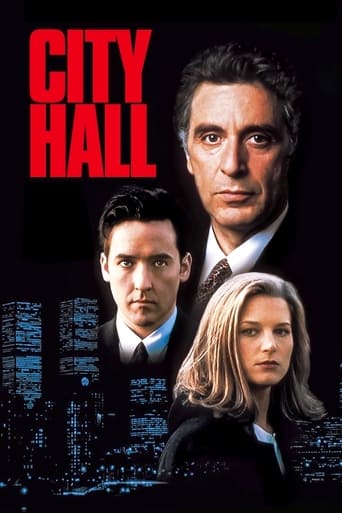
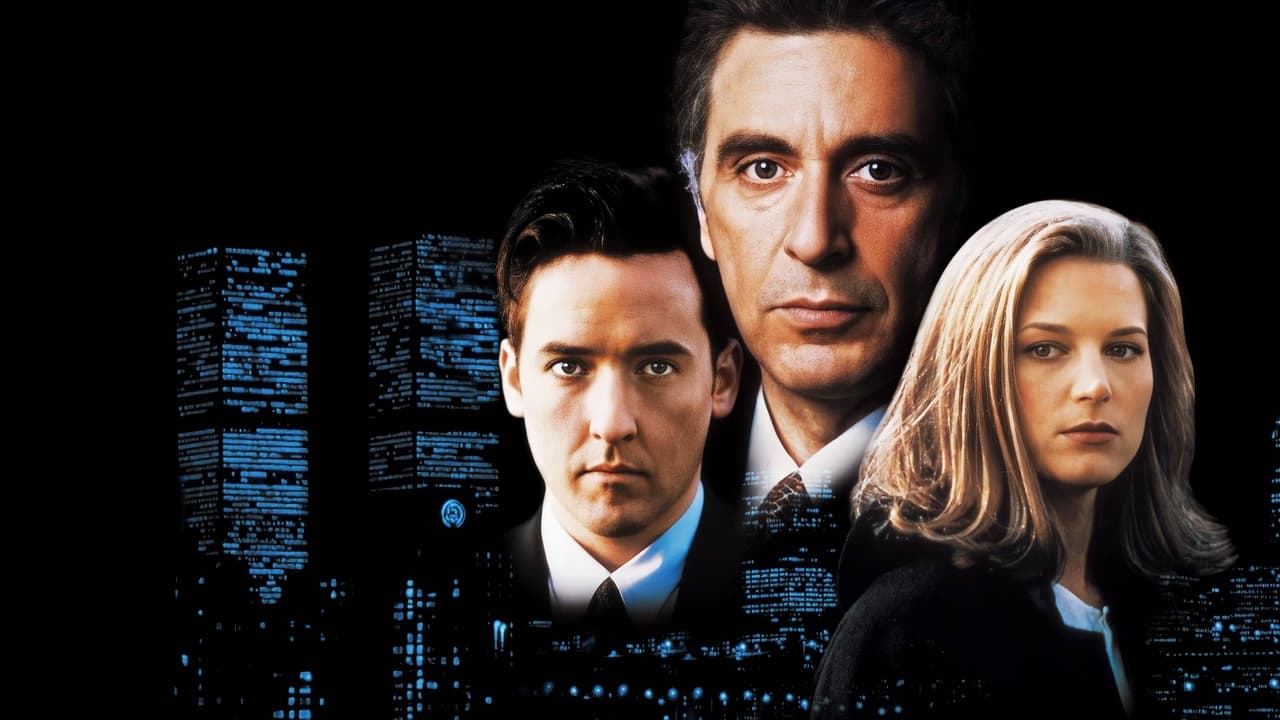

 AD
AD



